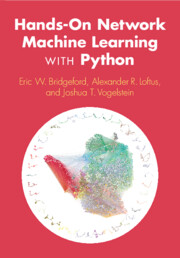Book contents
- Frontmatter
- Contents
- Preface
- Terminology
- Part I Foundations
- Part II Representations
- Part III Applications
- 6 Applications for a Single Network
- 7 Applications for Two Networks
- 8 Applications for Multiple Networks
- 9 Deep Learning Methods
- Appendix A Network Model Theory
- Appendix B Learning Representations Theory
- Appendix C Overview of Machine Learning Techniques
- Index
8 - Applications for Multiple Networks
from Part III - Applications
Published online by Cambridge University Press: 23 September 2025
- Frontmatter
- Contents
- Preface
- Terminology
- Part I Foundations
- Part II Representations
- Part III Applications
- 6 Applications for a Single Network
- 7 Applications for Two Networks
- 8 Applications for Multiple Networks
- 9 Deep Learning Methods
- Appendix A Network Model Theory
- Appendix B Learning Representations Theory
- Appendix C Overview of Machine Learning Techniques
- Index
Summary
This chapter explores advanced applications of network machine learning for multiple networks. We introduce anomaly detection in time series of networks, identifying significant structural changes over time. The chapter then focuses on signal subnetwork estimation for network classification tasks. We present both incoherent and coherent approaches, with incoherent methods identifying edges that best differentiate between network classes, and coherent methods leveraging additional network structure to improve classification accuracy. Practical applications, such as classifying brain networks, are emphasized throughout. These techniques apply to collections of networks, providing a toolkit for analyzing and classifying complex, multinetwork datasets. By integrating previous concepts with new methodologies, we offer a framework for extracting insights and making predictions from diverse network structures with associated attributes.
Keywords
Information
- Type
- Chapter
- Information
- Hands-On Network Machine Learning with Python , pp. 357 - 376Publisher: Cambridge University PressPrint publication year: 2025
Accessibility standard: WCAG 2.1 A
Why this information is here
This section outlines the accessibility features of this content - including support for screen readers, full keyboard navigation and high-contrast display options. This may not be relevant for you.Accessibility Information
Content Navigation
Allows you to navigate directly to chapters, sections, or non‐text items through a linked table of contents, reducing the need for extensive scrolling.
Provides an interactive index, letting you go straight to where a term or subject appears in the text without manual searching.
Reading Order & Textual Equivalents
You will encounter all content (including footnotes, captions, etc.) in a clear, sequential flow, making it easier to follow with assistive tools like screen readers.
You get concise descriptions (for images, charts, or media clips), ensuring you do not miss crucial information when visual or audio elements are not accessible.
